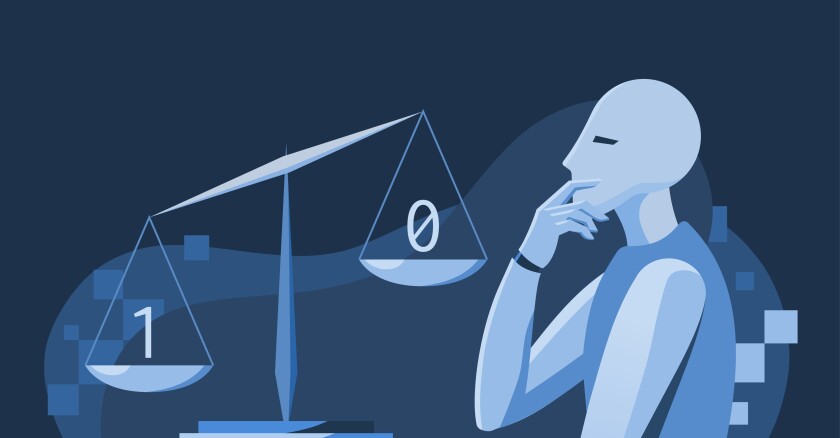Science
Aspen Institute’s Edtech Equity Project Fights Racial Bias in AI

The Aspen Institute has launched an initiative aimed at addressing racial bias in artificial intelligence (AI) learning tools used within the education sector. The project, which began in 2020, recognizes that Black and brown students comprise over half of the K-12 student population in the United States. Recent findings from Aspen Institute Fellows Nidhi Hebbar and Madison Jacobs reveal that many educational technologies perpetuate existing inequalities rather than alleviating them.
To combat these biases, the Aspen Institute has developed three targeted resources for schools and ed-tech companies. These include a set of criteria for companies to consider during the design process, a certification program in partnership with the nonprofit Digital Promise for those meeting these criteria, and a procurement guide aimed at helping educational leaders evaluate the equity practices of technology before implementation.
In a policy guidance document published in 2024, Hebbar and Jacobs highlighted several disparities affecting Black and brown students within the education system. These disparities encompass disproportionate disciplinary actions, placement in less rigorous academic tracks, and challenges in accessing advanced coursework. The report underscores how documented data, such as attendance, discipline records, grades, and test scores, can influence AI algorithms trained on this information.
“Without rigorous and intentional oversight, ed-tech products that use AI and machine learning will amplify the existing racial biases already present in the data within our school systems and introduce new biases through assumptions in algorithmic design,” the report states. As of now, there are no laws mandating ed-tech providers to disclose biases in their AI systems, placing the onus on schools to seek transparency and fairness from vendors.
The project’s initial major output, the AI in Education Toolkit for Racial Equity, serves as a resource for product teams developing AI tools. In its early ideation phase, the toolkit encourages teams to define their tool’s goals and values, evaluate whether AI is the right solution, and assess potential risks to racial equity. It prompts teams to scrutinize the assumptions and data sets that underpin their projects to mitigate biases early in the development process.
The toolkit also emphasizes the importance of ensuring that teachers receive training on equitable usage of these technologies. Hebbar expressed hope that companies would integrate the activities and practices outlined in the toolkit into their standard development processes, fostering a more equitable educational landscape.
In late 2021, the Aspen Institute partnered with Digital Promise to create a product certification known as **Prioritizing Racial Equity in AI Design**. This certification establishes industry standards for equitable design, based on the criteria outlined in the toolkit. It includes five key qualifications, such as the requirement for at least two bias-mitigation practices and the ability to override a product’s decisions for individual learners.
Additionally, the School Procurement Guide offers audit questionnaires and a rubric to assist K-12 districts in evaluating software tools based on equity criteria. This guide includes questions regarding how a product was developed, how it utilizes data, and the implications of racial information on that data.
“By asking the right questions during procurement, your school can become a powerful partner in advocating for equitable design and development of the products they use,” the guide emphasizes. This initiative aims to empower educational institutions to take an active role in ensuring that the technologies they adopt are designed with equity in mind, ultimately supporting all students in their learning journeys.
Through these efforts, the Aspen Institute’s Edtech Equity Project seeks to create a more just and equitable educational environment, addressing systemic biases and fostering opportunities for every student, regardless of their background.
-

 Health3 months ago
Health3 months agoNeurologist Warns Excessive Use of Supplements Can Harm Brain
-

 Health3 months ago
Health3 months agoFiona Phillips’ Husband Shares Heartfelt Update on Her Alzheimer’s Journey
-

 Science2 months ago
Science2 months agoBrian Cox Addresses Claims of Alien Probe in 3I/ATLAS Discovery
-

 Science2 months ago
Science2 months agoNASA Investigates Unusual Comet 3I/ATLAS; New Findings Emerge
-

 Science1 month ago
Science1 month agoScientists Examine 3I/ATLAS: Alien Artifact or Cosmic Oddity?
-

 Entertainment5 months ago
Entertainment5 months agoKerry Katona Discusses Future Baby Plans and Brian McFadden’s Wedding
-

 Science1 month ago
Science1 month agoNASA Investigates Speedy Object 3I/ATLAS, Sparking Speculation
-

 Entertainment4 months ago
Entertainment4 months agoEmmerdale Faces Tension as Dylan and April’s Lives Hang in the Balance
-

 World3 months ago
World3 months agoCole Palmer’s Cryptic Message to Kobbie Mainoo Following Loan Talks
-

 Science1 month ago
Science1 month agoNASA Scientists Explore Origins of 3I/ATLAS, a Fast-Moving Visitor
-

 Entertainment2 months ago
Entertainment2 months agoLewis Cope Addresses Accusations of Dance Training Advantage
-

 Entertainment3 months ago
Entertainment3 months agoMajor Cast Changes at Coronation Street: Exits and Returns in 2025









